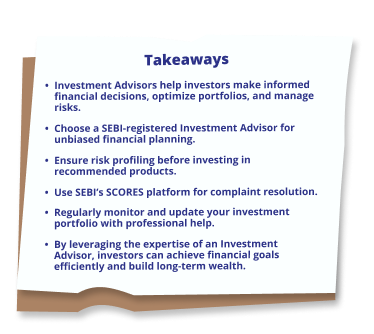Understanding Investment Advisors
Understanding Investment Advisors
Investing wisely is crucial for financial growth and security. However, navigating the complex world of stocks, mutual funds, bonds, and other investment avenues can be challenging. Investment Advisors (IAs) help investors make informed decisions by providing expert financial advice tailored to individual goals and risk tolerance. This article will provide a comprehensive understanding of investment advisors, the services they offer, grievance redressal mechanisms, benefits of engaging an advisor, and regulations protecting investors.
Who is an Investment Advisor?
An Investment Advisor (IA) is a SEBI-registered professional who provides personalized financial guidance to clients based on their financial goals, risk appetite, and market conditions. Unlike Mutual Fund Distributors (MFDs), who earn commissions from mutual fund sales, Investment Advisors charge fees directly from clients and provide unbiased recommendations.
Legal Definition (As per SEBI): According to the SEBI (Investment Advisers) Regulations, 2013, an Investment Advisor is an entity or individual that advises clients on financial securities, investment strategies, and portfolio allocation while adhering to SEBI-mandated fiduciary responsibilities.
Types of Investment Advisors
Investment Advisors can be categorized into:

- Individual Investment Advisors -Self-employed professionals registered with SEBI.
- Corporate Investment Advisory Firms - Large firms providing investment and wealth management services.
Unlike brokers and MFDs, Investment Advisors cannot receive commissions from product issuers and must act in the best interest of clients.

Services Offered by Investment Advisors: Investment Advisors provide a range of services to help investors optimize their financial portfolios.
Financial Planning & Goal-Based Advisory:
- Assess income, expenses, financial goals, and risk tolerance
- Develop customized investment plans for short-term and long-term objectives (e.g., buying a house, retirement planning, child’s education).
- Offer tax planning strategies to maximize savings.
Portfolio Construction & Asset Allocation:
- Recommend an optimal mix of equities, debt instruments, gold, and alternative investments.
- Create a diversified portfolio to minimize risks and maximize returns.
- Suggest portfolio adjustments based on market trends and economic conditions.
Investment Recommendations & Execution Assistance:
- Provide buy, hold, or sell recommendations for stocks, bonds, mutual funds, and ETFs
- Assist in selecting Direct Mutual Fund Plans (without commissions).
- Guide on investing in REITs, government securities, and international markets.
Risk Management & Contingency Planning:
- Assess market volatility and recommend hedging strategies.
- Suggest insurance plans for wealth protection and risk mitigation
- Monitor portfolio performance and rebalancing strategies to align with financial goals.
Retirement & Estate Planning:
- Develop long-term investment plans for retirement.
- Provide strategies for income generation post-retirement.
- Assist in estate planning and wealth transfer strategies.
Tax Optimization & Legal Compliance:
- Help minimize capital gains tax, dividend tax, and wealth tax.
- Ensure compliance with investment laws and regulatory changes.
- Provide documentation support for tax filings and audits.
Grievance Redressal Mechanism for Investors
SEBI has established a robust grievance redressal system to protect investors from unethical practices by Investment Advisors.
Steps to Lodge a Complaint
Contact the Investment Advisor Directly – Raise the issue via email or written communication.
Escalate to SEBI’s SCORES Portal (https://scores.sebi.gov.in/) if unresolved.
Investment Advisors must respond within 21 days.
Benefits of Using an Investment Advisor:
Unbiased and Conflict-Free Advice: Investment Advisors do not earn commissions, ensuring objective recommendations. They may suggest Direct Mutual Fund Plans, which have lower expense ratios than regular plans
Custom-Tailored Investment Strategies: Investment Advisors provide personalized advice based on financial goals, risk tolerance, and time horizon. Investment Advisors help to develop Portfolio designed to maximize returns while managing risks effectively.
- Market Expertise & Research-Based Decisions:
- Access to detailed market research and advanced analytics.
- Professional guidance helps avoid emotional investing mistakes (e.g., panic selling during market downturns).
Portfolio Monitoring & Risk Management: Investment Advisors continuous track the portfolio performance and accordingly asset rebalancing is done. Investment Advisors adjusts investments based on changing economic conditions
Long-Term Wealth Creation: Investment Advisors helps to achieve financial independence through disciplined investing. Investment Advisors advises on compounding strategies to build wealth over time.
SEBI Regulations for Investment Advisors
Investment Advisors in India must comply with SEBI’s regulations to ensure investor protection.
- Registration & Qualification Requirements
- Must pass NISM-Series-X-A & X-B Investment Advisor Certification Exams.
- Obtain SEBI Registration Number (RIA) before offering services.
- Maintain a minimum net worth.
- Code of Conduct for Investment Advisors
- Fiduciary Responsibility – Always act in the client’s best interest.
- Transparency – Disclose all fees, conflicts of interest, and product commissions.
- No Misrepresentation - Prohibited from guaranteeing returns or mis-selling products.
- Client Risk Profiling & Suitability Assessment
- Conducts risk profiling before recommending investments.
- Investments must align with client's financial goals and risk appetite.
- Cannot sell high-risk investments to conservative investors.
| Criteria | Investment Advisor (IA) | Mutual Fund Distributor (MFD) |
|---|---|---|
| Registration Authority | SEBI | AMFI |
| Revenue Model | Fee-based | Commission-based |
| Product Suitability Check | Mandatory | Not mandatory |
| Can Offer Direct Mutual Funds? | Yes | No |
| Conflict of Interest | Low | Higher due to commissions |
